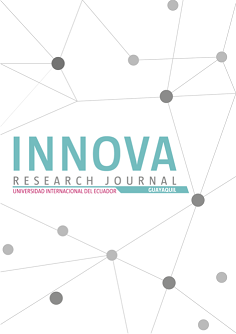Active methodologies for learning the measuring instrument-micrometer
Main Article Content
Abstract
The objective of this study is to promote the use of active methodologies for learning the direct measurement instrument, micrometer, while applying its operating principle, screw-nut. What is described in this article, it can be used for the Metric and the English systems of units (0.01 mm and 0.001 inches respectively), by means of the extension of the graduation scales (which will be limited according to the step of the threaded element used) of the main scale, recorded on the outer cylinder as well as on the vernier scale, engraved on the thimble, whose enlargement of the graduations will depend on the diameter in the area where they are made. A brief introduction was also made on Metrology, measurement systems and units of measure, as well as the measurement instrument used in the present study, as well as a proposal on how to obtain the assessment or resolution of the measurement instrument. In order to achieve the validity of this study, and obtain a meaningful and lasting learning, the following active learning methodologies were used: cooperative work, where students work together to achieve a common goal and they are responsible for all those who work in the group, they can learn from each other, while developing skills of group work; problem-based learning, where students are expected to build their knowledge with problems and real-life cases and project-based learning, where the student from the beginning are faced with active learning through simple engineering projects, methodologies which allow the students to participate actively and be motivated in their training process as a future professional in engineering through proper planning of group activities in classes, guided by the teacher, with meaningful materials conceptually easy to understand. To finalize the study, we proceed to develop an application project, which consists of the development of an element that represents the main scale and vernier scale of a micrometer in wood with their respective graduations.
Keywords: Learning; methodologies; metrology; micrometer; unit system.
Downloads
Article Details
COPYRIGHT NOTICE
Authors who publish in the INNOVA Research Journal keeps copyright and guarantee the journal the right to be the first publication of the work under the Creative Commons License, Attribution-Non-Commercial 4.0 International (CC BY-NC 4.0). They can be copied, used, disseminated, transmitted and publicly exhibited, provided that: a) the authorship and original source of their publication (magazine, publisher, URL and DOI of the work) is cited; b) are not used for commercial purposes; c) the existence and specifications of this license of use are mentioned.
References
Ballester, E. (2015). Metodologías docentes y de evaluación para la formación en competencias en la asignatura de "Eficiencia energética de instalaciones térmicas. En M. Mata, Innovación educativa en las enseñanzas técnicas (Vol. II, págs. 833-845). España: Ediciones de la universidad de Castilla-La Mancha.
Benítez, L., & Martínez, R. (2014). La cooperación y colaboración en la educación superior tecnológica: un paradigma en construcción.En R. Martínez, M. Villanueva, & E. Canales, Aprendizaje cooperativo: una alternativa para mejorar la instrumentación didáctica en la Educación Superior Tecnológica (págs. 21-38). México: Ediciones Díaz de Santos.
Chávez, F., Mejía, R., & Pacheco, G. (2009). Introducción a la metrología dimensional. México: Instituto Politécnico Nacional.
De las Morenas, J., De la Cruz, J., León, S., Martínez, F., Zarate, R., & Carrasco, M. (2015). Experiencia de colaboración docente entre I.E.S. Mercurio y la E.I.M.I.A en la construcción del prototipo de un vehículo eléctrico. En M. Mata, Innovación educativa en las enseñanzas técnicas (Vol. II, págs. 777-787). España: Ediciones de la Universidad de Castilla-La Mancha.
Del Campo, M., & Robles,J. (2012). La metrología, motor de innovación tecnológica y desarrollo industrial. e-medida, 1(1), 29-41. Obtenido de http://www.e-medida.com/documentos/Numero-1/articulos.
Escamilla, A. (2014). Metrología y sus aplicaciones. México: Grupo Editorial Patria.
Fenoll, J., Borja, J., & Seco de Herrera, J. (2009). Mecanizado básico. Madrid: Mac Millán Iberia S.A.
García, J., & Fernández-Bravo, P. (2010). Mecanizado básico. Madrid: Paraninfo.
González, F. (2010). El Mapa Conceptual y el Diagrama UVE. Recursos para la Enseñanza Superior en el siglo XXI. Madrid: Narcea S.A. de Ediciones.
Herrero, I., García,C., González,E., Molina-Tanco, L., Pérez, E., & Urdiales, C. (2013). Aprendizaje cooperativo en el ámbito de la Ingeniería: una experiencia de iniciación al Trabajo en Grupo. Revista de docencia Universitaria, 11(Número especial dedicado a Engineering Education), 221-251. Obtenido de http://red-u.net.
Instituto Mexicano de Normalización y Certificación, A.C. (2013). Vocabulario Internacional de Metrología-Conceptos fundamentales y generales, y términos asociados (VIM). NMX-Z-055-IMNC-2009. Obtenido de Catálogo de Normas: https://www.imnc.org.mx/.
Martín, F. (2010). Fomentar el aprendizaje. En D. Cervera, Didáctica de la tecnología (págs. 77-92). España: GRAÓ.
Ortiz Campos, F. J., Ortiz Cerecedo, F. J., & Ortiz Cerecedo, F. J. (2017). Matemáticas 2. México: Grupo Editorial Patria, S.A.
Owen, C. (2011). Basic Automotive Service and Systems. Canadá: Delmar, Cengage Learning.Raghavendra, N., & Krishnamurthy, L. (2013). Enginneringmetrology and measurements. India: Oxford University Press.
Rodríguez, A., & Larruscain, J. (2015). Metodologías activas PBL en la asignatura Sistema de Gestión Integrada. En M. Mata, Innovación educativa en las enseñanzas técnicas (Vol. II, págs. 801-808). España: Ediciones de la Universidad de Castilla-La Mancha.
Rodríguez, K., Maya, M., & Jaén, J. (2012). Educación en Ingenierías: de las clases magistrales a la pedagogía del aprendizaje activo. En Ingeniería y desarrollo (págs. 125-142). Barranquilla: Universidad del Norte.
Stefanelli, E. (2017). Metrología. Obtenido de Micrómetro en centésimas de milímetro –uso, lectura e interpretación: https://www.stefanelli.eng.br/es/micrometro-centesimas-milimetro-uso/.
Trejo, J., Ramírez, E., Mata, F., & Hanafi, I. (2014). La experiencia del aprendizaje basado en problemas y trabajos proyectuales en las asignaturas de ingeniería de estructuras en la Escuela de Ingeniería de Almadén. En M. Mata, Innovación educativa en las enseñanzas técnicas (Vol. II, págs. 615-627). España: Ediciones de la Universidad de Catilla-La Mancha.
Yadarola, M. (2012). Cambios de modelos en la formación y práctica de la ingeniería. Buenos Aires: ANI -Academia Nacional de Ingeniería.






